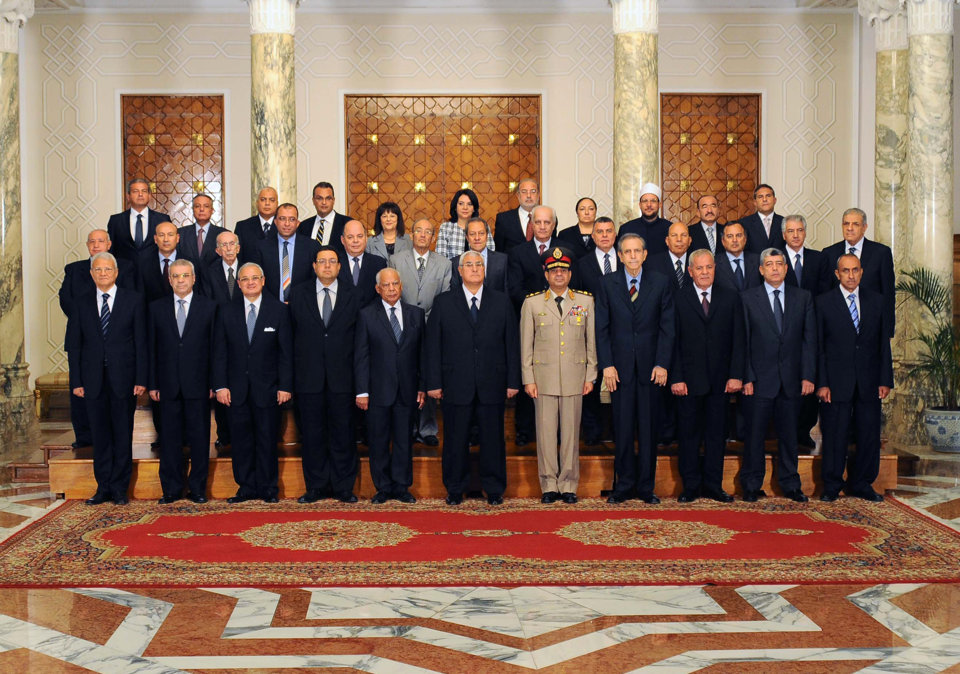
Ziad Bahaa Eddin spent six months as Deputy Prime Minister and International Cooperation Minister in the government of Hazem Beblawy. He resigned after issuing the protests law, and returned to his political career as Vice President of the Egyptian Democratic Party.
In an interview with Al-Masry Al-Youm, Bahaa Eddin talked about the current political situation and his opinion about the election law and the redistricting of the electoral constituencies. He also said freedoms were lessened, the government is confused and the tendency is to silence protests.
Q: What do you think of the amendments to the election law and the redistricting of the electoral constituencies?
A: The problem is that we have started with a very bad law. Everybody warned that it is unconstitutional. The “Absolute List” is a bad system unheard of in any democratic country.
Q: Why did the political parties not raise this issue with the government?
A: The government and the Transitional Justice Minister insisted on it. The government issues laws for the president, who has legislative powers, to endorse. You cannot do so without consulting with the competent authorities. We have experts in the Justice Ministry, the State Council, the universities and the political parties. The government claims it wants to solve the problem, but insists on holding the elections on time. I do not believe it wants to improve the law.
Q: How do we deal with the ruling of the Supreme Constitutional Court regarding the law on redistricting the electoral constituencies?
A: Either we look at it as a law that has a simple defect that can be corrected, or we devise a new law. I believe the first option is what the government wants.
Q: Some believe the government does not want to hold parliamentary elections at the moment. Is that right?
A: No, I think it wants to hold them as soon as possible because the current situation cannot go on like this if we seek local and international credibility. Egypt is not a small country to dispense with parliament.
Q: Did your party present proposals for the law during the dialogue sessions?
A: Yes, we suggested that the main flaw in the legislative system as a whole be addressed.
Q: What was the response?
A: The talk was limited to increasing the number of lists, but not to abolish the “Absolute List” system.
Q: Why is the government lenient with the Nour Party although it is a religious entity?
A: I am against religious parties in principle, but I think the problem is that there are no clear definitions in the legislative bodies for religious parties.
Q: Why does the government not put down clear definitions?
A: I do not know, but I know that it is not proper for the government to turn a blind eye because some party supports it.
Q: What do you think of attempts to form a unified list that would serve as a foothold for the president in parliament?
A: It is a defect of the election law that allows for absolute lists that form unnatural alliances.
Q: Do we need to postpone the parliamentary elections until we build a proper legal structure?
A: We are already a year late. But if we postpone for a real reform, I agree.
Q: Would the elections bring back the Salafis or the Muslim Brotherhood in light of the weakness of the political parties?
A: No, the Brotherhood lost all popularity when it failed. Also, there is no need to worry if 80 percent of the seats are for individual runners.
Q: But individual runners can come from religious backgrounds, right?
A: Not if you control the process, forbidding bribes and false campaigning.
Q: Should members of the Mubarak regime and the Muslim Brotherhood be banned from running in the elections?
A: I am against exclusion in principle. The people should vote for whomever they want.
Q: What do you think of remnants of the Mubarak regime like Ahmed Ezz running in the elections, would this mean the Mubarak regime is coming back?
A: Again, I am against exclusion. And there is a difference between individuals of a regime and the policies of that regime. For example, economic policies not in favor of the poor are not accepted, regardless of the minister who had carried them out.
Q: What do you think of the acquittals the courts have issued for the symbols of the Mubarak regime that gave a general feeling that the revolution was in vain?
A: No comment.
Q: Are you running in the upcoming parliamentary elections?
A: No.
Q: Will you continue working for the party?
A: Yes.
Q: What if the party nominates you?
A: I still have the right to decline.
Q: What do you think of the widely criticized human rights situation in Egypt?
A: There is no doubt that freedoms were lessened. We have laws that contradict the Constitution that we chose, such as the law restricting NGOs and the law restricting protests.
Q: How can you criticize the protests law if it was issued when you were Deputy Prime Minister?
A: I resigned because of it.
Q: Why did the government issue it?
A: I think it was a miscalculation of the young generations that felt politically alienated.
Q: Do you think the government would amend this law?
A: I think there is a tendency to silence all protests.
Q: What do you think of efforts to bring back money that was syphoned abroad?
A: We should prove that such money was illicit because not all the money deposited in banks abroad is illegal.
Q: Do you approve of reconciliation with the former regime figures?
A: If standards are applied to all with judicial oversight, and if transparency is heeded in disclosing information for the public, then I have no problem with it.
Edited translation from Al-Masry Al-Youm


